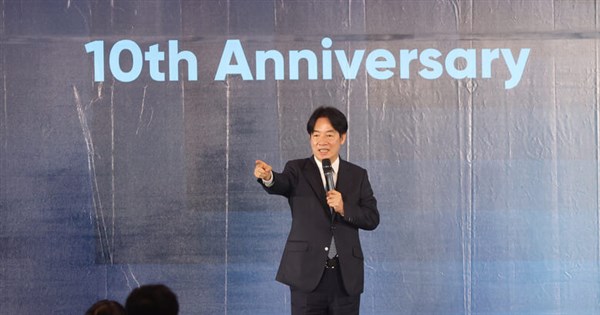Lai promises to continue cybersecurity development

Taipei, May 15 (CNA) President-elect Lai Ching-te (賴清德) said his presence at an annual cybersecurity exposition Wednesday illustrated his interest in continuing the government’s support for the development of the cybersecurity sector after he takes office on May 20.
Lai made the pledge at the Cybersec 2024 Conference one day after President Tsai Ing-wen (蔡英文) attended the expo’s opening ceremony on Tuesday.
“I’ve been asked to give remarks at the Cybersec Conference for the first time, and I know what that means. I promise today that I’ll continue supporting the cybersecurity industry [as the next president],” Lai said.
His administration will continue to work with the private sector and academia on building the sector, according to the president-elect.
“Our resolve is shown by the fact that Vice Premier-designate Cheng Li-chun (鄭麗君), Digital Affairs Minister-designate Huang Yen-nun (黃彥男), and National Security Council (NSC) advisor-to-be Lee Yuh-jye (李育杰) are also here with me today.”
Lee, whose appointment was announced Tuesday, is a research fellow at Academia Sinica’s Research Center for Information Technology Innovation and the project convener of the Trustworthy AI Dialogue Engine (TAIDE), Taiwan’s self-built large language model.
Citing the 2024 World Economic Forum’s report on global risks, Lai said AI-generated misinformation and disinformation was forecast to be the most severe risk in the short term (over a two-year period) and cyber insecurity was ranked fourth.
“That is the reason why we need to follow President Tsai’s ‘cybersecurity is national security’ policy,” the president-elect said.
Taiwan is among the most attacked countries when it comes to cyberattacks and disinformation, Lai said. “But the silver lining is that it means we have a training field more effective than other countries to train our cybersecurity abilities and develop the industry.”
Cybersec 2024 Chairman Merton Wu (吳其勳) said at Wednesday’s conference that this year’s expo, with its enlarged capacity, gives insight into that training through an event called “Cyber Arena” offering “cybersecurity drills.”
“Participants can learn in the drills how to identify and respond to China’s cyber armies’ cyberattacks, strengthening our cybersecurity resilience,” Wu said.
He said the presence of Tsai and Lai on consecutive days signified the expected “seamless continuance” of Taiwan’s national cybersecurity policy.


